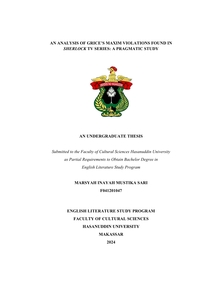SARI, MARSYAH INAYAH MUSTIKA (2024) An Analysis of Grice's Maxim Violations Found in Sherlock TV Series: A Pragmatic Study=An Analysis of Grice's Maxim Violations Found in Sherlock TV Series: A Pragmatic Study. Skripsi thesis, UNIVERSITAS HASANUDDIN MAKASSAR.
![[thumbnail of cover]](/46374/1.hassmallThumbnailVersion/F041201047_skripsi_28-08-2024%20cover1.jpg)

F041201047_skripsi_28-08-2024 cover1.jpg
Download (245kB) | Preview
F041201047_skripsi_28-08-2024 bab 1-2.pdf
Download (6MB)
F041201047_skripsi_28-08-2024 dp.pdf
Download (541kB)
F041201047_skripsi_28-08-2024.pdf
Restricted to Repository staff only until 26 July 2027.
Download (6MB)
Abstract (Abstrak)
This study aims to (1) identify the types of maxim violations found in Sherlock TV series, (2) determine the dominant types of maxim violations in the Sherlock TV series, and (3) reveal the reasons behind the maxim violations in the Sherlock TV series. This study used a descriptive qualitative method. The data were obtained from the Sherlock TV series via a streaming platform named Prime Video. The categories of maxim violations were determined based on the Cooperative Principle theory by H. Paul Grice. The data analysis was conducted in several steps. First, the Sherlock TV series was watched, and the writer proceeded to identify the maxim violations. After that, each utterance of maxim violations was analyzed and determined. The writer then ranked the most to least dominant types of violations and revealed the reasons behind the maxim violations. Based on the results of the analysis, four types of maxim violations are identified. From most to least dominant, the types of violations are: violation of the maxim of quality, violation of the maxim of relevance, violation of the maxim of manner, and violation of the maxim of quantity. Furthermore, five categories of reasons for these violations are found: misleading the hearer, saving face, communicating self-interest, avoiding the discussion, and protracting the answer.
| Item Type: | Thesis (Skripsi) |
|---|---|
| Uncontrolled Keywords: | conversational maxims, maxim violation, Sherlock, TV series |
| Subjects: | P Language and Literature > PR English literature |
| Divisions (Program Studi): | Fakultas Ilmu Budaya > Bahasa Inggris |
| Depositing User: | Unnamed user with username pkl2 |
| Date Deposited: | 10 Jul 2025 01:02 |
| Last Modified: | 10 Jul 2025 01:02 |
| URI: | http://repository.unhas.ac.id:443/id/eprint/46374 |


